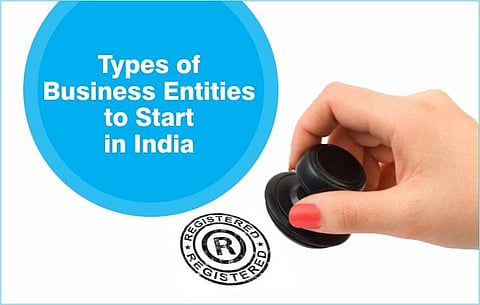
- News
- Women
- Magazine
- IndustryIndustry
- InsightsInsights
- Success Stories
- PublishPublish
- ContactContact
- Media KitMedia Kit

Types of Business Entities to Start in India
Presently, India is considered an emerging market with a lot of opportunities for investors. The diverse economy presents all sorts of business entities for doing business in the country. Here, there are five major business entities, which are trading in the entire country:
Sole proprietorship
A sole proprietorship is a business that is owned and managed by a single person; it is also known as a one-man army. The liability of the sole proprietor is limited to the extent of capital contributed by him. As it is run by a single owner so, all the profit and loss is shared by that single person only. It is quite famous among the unorganized sector, mainly small traders and merchants. There is no such thing as registration; proprietorships are recognized by other registrations, such as a service or sales tax registration.
Features
Sole Proprietorship doesn't have any legal formalities
Its advantages include ease of formation and less legal formalities
The owner is the sole recipient of all profits and bearer of all loses
The owner is liable for all the business debts
Partnership Firm
Partnership firm is initiated with the relation between persons who have agreed to share the profits of the business carried on by all or any one of them acting for all. The minimum members to form a partnership are 2, and the maximum is 10. It is governed by the Indian Partnership Act 1932.
Features
In a partnership firm, the regulatory and disclosure norms are relatively simple
Every partner gets unlimited liability
The profit shared among partners is on the basis of the agreed ratio
Limited Liability Companies
Limited Liability Companies provide limited liability to owners. It is a corporate body and has its own existence in the eyes of the law. The act of 2008 gives LLP the freedom to manage its own affairs. It is a cheaper approach to incorporate as compared to a Private Limited Company and requires less compliance.
Features
To become a partner of LLP, there is no a huge lengthy complicated process
It is easy to form as well as easy to become a partner
It limits the liabilities of its partners to their contributions to the business and offers each partner protection from negligence, misdeeds or incompetence of the other partners
Private Limited Company
Private Limited Company is the most popular business structure. It is defined as a voluntary association of not less than two and not more than 50 members. Under this business type, the liability is limited; the transfer of whose shares is limited and not allowed to invite the general public to subscribe to its shares.
Features
Private Limited is most suitable for modern times as it provides a path whereby ownership can be separated from management
It allows outside funding to be raised easily and enables shareholders to offer employee stock options to attract top talent
It limits the liabilities of its shareholders
Public Limited Company
A Public Limited Company is that company which is owned by the public or in which the public can subscribe. Here, there should be a minimum of 7 members, there is no upper limit.
Features
This kind of company can raise capital from the public directly through issues of shares.
The shareholders have limited liability to the extent of the face value of its shares
One Person Company in India
One Person Company in India was started under the Companies Act, 2013. It supports entrepreneurs carrying on the business in the Sole-Proprietor form of business with a Corporate Framework.
Features
One Person Company can be formed with only one member
The OPC has some industry-specific advantages
Follow us on Google News
